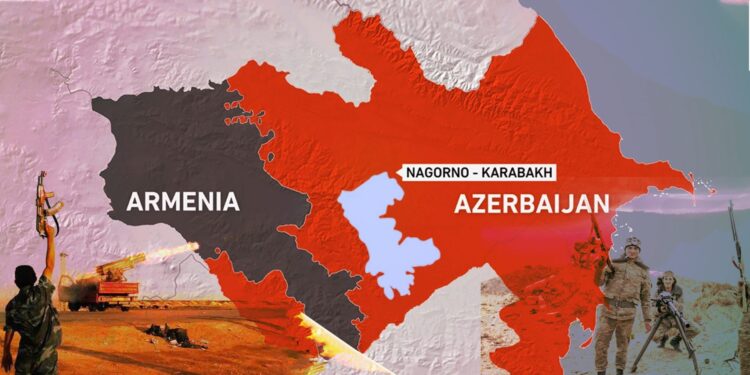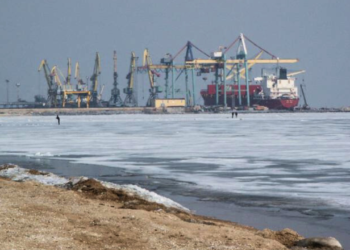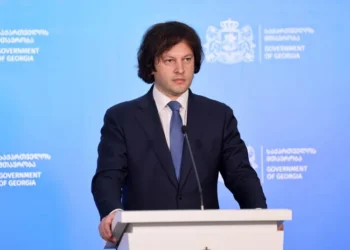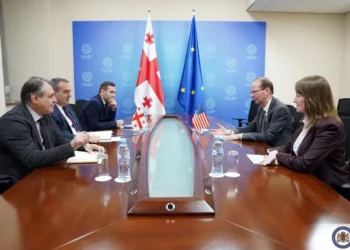Armenia is cornered, especially with Georgia pivoting towards Moscow. Without Georgia, there is no Europe for Armenia” – Eugene Kogan, a defense and security expert on Eastern Europe and the Middle East at the Vienna Institute for International Politics, who has lived in Georgia for the past decade, tells Radio Free Europe’s Georgian service.
In this wide-ranging conversation, Kogan offers a stark assessment of the much-hyped Armenia–Azerbaijan peace deal. Though labeled “historic,” the agreement remains stalled. Baku, holding the stronger hand, is in no rush to finalize it—using the drawn-out process to pressure Armenia into further concessions, including the Zangezur corridor and constitutional changes on Nagorno-Karabakh. Meanwhile, Armenia, increasingly isolated and eager to sign, lacks meaningful alternatives or strong international backing. Without a neutral mediator and amid shifting regional alliances—especially Georgia’s pivot toward Moscow—the deal looks more like a tool of leverage than a step toward lasting peace.
The deal’s been described as historic, but how close are the sides to actually signing and enforcing it?
I think you’re putting the cart before the horse. There’s not much to celebrate at this point. Despite all the international encouragement, we’re nowhere near the finish line. What we have now is at best a draft of a potential disagreement. One side—Armenia, particularly Prime Minister Pashinyan—is eager to sign. But I don’t see the same eagerness from Baku. As the saying goes, it takes two to tango, and the second dancer clearly isn’t dancing to the same tune. Azerbaijan keeps presenting new preconditions for Armenia to accept.
So they’re trying to extract as many concessions as possible before signing?
Absolutely. Armenia is the weaker party, and when the weaker side shows eagerness, the stronger one exploits it. This is classic salami tactics: slice by slice, demand after demand.
But what’s Armenia’s alternative? Do they have one?
Not really, and, what’s worse, I don’t think the government is even considering any. Pashinyan sees this as the only available option. The opposition, on the other hand, might prefer more Russian involvement. I often hear talk of “Russia returning to the South Caucasus,” which I find odd, because Russia never really left.

Still, putting all your eggs in Moscow’s basket didn’t work well for Armenia in the not so distant past. The eggs got broken.
It didn’t, but it’s not really about whether it’s a better alternative. It’s about having some alternative, or at least pretending there is one to improve Armenia’s negotiating position, to save face. Right now, Armenia is cornered, especially with Georgia pivoting towards Moscow. If Georgia continues in that direction, Armenia’s European path effectively disappears. Without Georgia, there is no Europe for Armenia.
Back to your tango metaphor: not only is one dancer off-beat, they’re the one choosing the music. Armenia has to follow, not lead.
Exactly. And I don’t see that working out. If you want a historical parallel, think of 1979: Egypt and Israel, under Sadat and Begin, with America playing a crucial role. You need a powerful third party pressuring both sides. That’s missing here. There is no such powerful mediator or facilitator involved – those that are would be far happier pressuring only Armenia. Azerbaijan is in no rush. Their key demands—the Zangezur Corridor, dissolution of the Minsk group format and Armenia removing all constitutional claims to Nagorno-Karabakh—are still unresolved. They’re willing to achieve their goals by peaceful or military means.
So why talk publicly about a finalized draft if there’s no real intention to sign?
To keep squeezing concessions. Azerbaijan can keep inventing new demands indefinitely.
Even if Armenia says yes to the Minsk Group dissolution and the constitutional changes, couldn’t Baku see value in having Armenia as a peaceful, cooperative neighbor?
I don’t think so. Look at Baku’s rhetoric: they call Armenia a fascist state, and Aliyev routinely humiliates Pashinyan in public. There’s no indication they see Armenia as a potential partner. To them, it’s a hostile, alien entity wedged between themselves and Turkey.
So no realistic prospect for a peace deal, not even an unfavorable one for Armenia, that might still hold?
I don’t see it. Even if a deal is signed, I doubt it’ll last. It’ll soon be violated, and Azerbaijan will claim Armenia broke its word and demand more. That’s the cycle.
What’s really at stake in the Zangezur Corridor? How would that affect the region as a whole?
Quite a bit. There’s already a pipeline from Turkey to Nakhichevan. What’s left is the last 40 kilometers linking Nakhichevan to mainland Azerbaijan. If Baku takes that, the Syunik province could fall under its control too. It offers an alternative to the BTC pipeline and increases Azerbaijan’s economic and geopolitical leverage. They can pressure Georgia, renegotiate terms, and assert dominance in the region. This has been Aliyev’s long-term goal for years – to emerge as the regional leader and dictate the terms to its two neighbors.
If we were to look at the external actors, who stands to gain or lose should that scenario materialize?
Iran dislikes it, but lacks sufficient clout to engage militarily on behalf of Armenia. Russia isn’t opposed: it sees this as Armenia’s punishment for stepping out of line. The Kremlin’s message is clear: “You wanted independence from us? Fine. Now pay the price.” By greenlighting Baku’s moves, Moscow is trying to push Armenia back into its orbit. Turkey, meanwhile, is on board—they want more gas exports to Europe.
That sounds like Russia surrendering influence to Turkey and Azerbaijan. Doesn’t that contradict their regional doctrine that held for centuries? That nothing should be done without Moscow’s say-so?
It might seem so, but there’s a tacit understanding between Moscow, Ankara, and Baku. Their shared goal is to block the West from gaining a foothold and, what’s worse, bringing democracy into the region. That’s the logic behind the 3+3 format: the idea that only local players get to decide what happens in the South Caucasus. No role for the US. Even less for the EU. It’s ideal for Russia, Turkey, Azerbaijan, and even Iran. Armenia will be pressured to join, and Georgia looks like it will be dragged in too. In fact, Moscow is already suggesting, not so subtly, that there’s a seat waiting for Tbilisi.
If Azerbaijan gains full control of the Zangezur Corridor, what does it mean for Georgia?
It’s a major blow. Zangezur offers Azerbaijan a bypass that sidelines Georgia as a transit country. That means less revenue and diminished strategic importance. Georgian Dream doesn’t seem to grasp this—they operate on short-term thinking. Their policy appears to be enriching themselves while impoverishing the rest. No long-term vision. And when you don’t think about consequences, you eventually pay the price. Even if the Kremlin is currently content with Georgian Dream’s behavior, it could still tighten the screws—say, demand an apology once this “investigative commission” set up by the Georgian Dream finishes blaming the previous government for the 2008 war. It would be a ritual humiliation to remind Georgian Dream where they stand. Moscow will squeeze their proverbial balls until they cry, and then “ask” for more concessions.
How did we get here? Has Georgia made the right moves since the start of the Ukraine war?
Not at all. Georgian Dream played a foolish hand. It began with that ridiculous claim that the West wanted Georgia to open a second front against Russia. That didn’t win them friends: it tied them to Moscow instead. A major blunder.
And if it wasn’t a blunder?
Then it’s even worse. Because if it was intentional, it was reckless and dangerous. But honestly, I don’t think they even have one person in the party capable of laying out pros and cons before making a decision. They’ve burned every bridge to the West for no gain and chained themselves to Russia. You might be Pro-Russian but it’s still a foolish thing to do, leaving yourself at the Kremlin’s mercy. Now they’re stuck with Russia, and still think of themselves as strategic geniuses. It’s absurd.
Interview by Vazha Tavberidze














